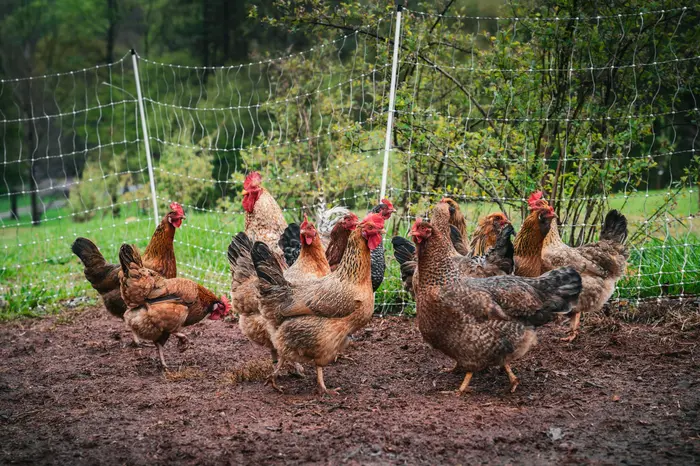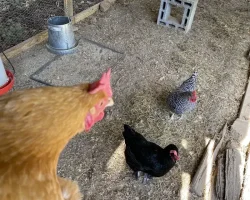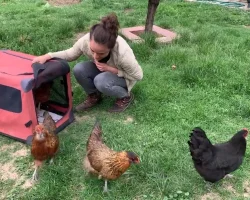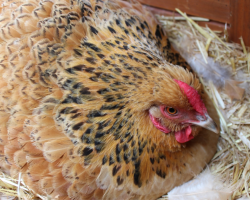Chicken sounds are a set of clues. Is that cluck a warning or does the squawk mean happiness?
If you are reading this, you care about what your chickens are saying and want to know when to take action.
Chickens make around 30 sounds, but here I focus on the ones you will hear often. I have also added audio/video from real flocks so you hear real chicken sounds. Plus, we will go over how to handle chicken noise before and after it gets annoying.
Know interesting things about your flock by reading on to learn what each sound means.
How to Speak Chicken?
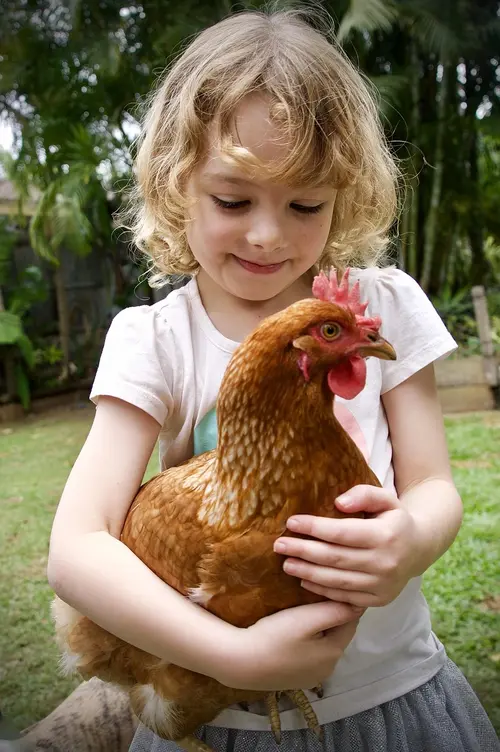
You would wonder, can we really understand chickens? Research shows humans can tell the difference between chicken contentment and frustration. So, If you study your chicken closely, you might master their language.
Chickens talk through sounds and sometimes use body movements too. For example, the puffing up a broody hen does when she’s scared.
Melissa Caughey’s book, “How to Speak Chicken,” talks about these behaviors. It’s a great book for understanding chicken communication.
Now, let’s see the common chicken sounds and what they mean.
7 Common Chicken Sounds and Their Meanings
1. Content Chicken Clucks
A low humming sound like a soft purr shows your chickens are happy. It’s not alarming but a calm sound as they go about their day.
This sound shows your chicken is feeling good. It’s a nice sound which means you’ve done a great job. Keep them happy by feeding them well and keeping their coop clean.
2. Egg Song
Imagine a music band, where one hen says “buk, buk, buk, ba-gawk!”. Then another hen joins in… then another… and another… This is called the egg song.
The other chickens might not have laid an egg but join to celebrate with her. There’s no worry when this sound happens unless it becomes wild. It could mean something is going on and needs your attention.
Hear the proud clucking sound when hens lay an egg.
3. Nesting Spot Calls
A rooster finds an area and fluffs anything that can make a bed. He clucks around like he’s thinking about interior design. Hear the steady hum as he arranges the bedding.
Roosters prepare the bedding for hens. Their clucking says, “Look, I made this for you.” If the hen likes it, she stays. If not, she walks away, and the rooster tries again.
When roosters make this sound, make sure there are enough clean spots around the coop.
4. Broody Hen Growls
When you or anything comes close to a broody hen, she growls. She puffs up like a balloon, followed by a deep rumble sound. That’s her telling you to stay back.
If you bother her more, she might peck you. It’s not anger, she’s just protecting her eggs or newly hatched chicks.
Just like any mother, she’s keeping her eggs safe from danger. But sometimes, she cares so much that she forgets about herself.
So, make sure food and water are easy for her to reach. Place them close so she doesn’t leave her nest for long.
Heads up! Sometimes these broody hens sit on eggs that are not theirs nor even fertilized. This becomes a problem as your broody hen could stop laying eggs. That’s just a few among the problems. See this article on how to prevent broody hens!
Here’s how they sound:
5. Chick Chirps
The cute chicks mostly talk through chirps. A steady peep shows the chicks are happy. When something’s wrong, they chirp loudly, showing danger or hunger.
When you hear the loud chirping, quickly check on your chicks. Usually, they might be cold or stuck in a corner and need your help.
6. Rooster Crowing
At dawn, a rooster boldly pierces the quiet morning with a crow. Often, when one rooster crows, others nearby respond. This crow is a signal to the flock, indicating the start of activity for the day.
The first rooster to crow is usually the head, followed by low-ranking roosters. The head’s crow also expresses dominance and warns any rival to stay away.
In case your rooster crows during odd hours, it might be a threat. You need to make sure everything is fine.
Listen below as the rooster crows to establish the day.
7. Distress Call
“Ow” is the sound you make when you stub a toe. For chickens, it’s a sharp and loud squawk. But when this sound becomes a longer and piercing cry, it’s an alarm. They could be attacked by a predator or separated from their flock.
The vulnerable chickens often exhibit these sounds. By doing so, they make the whole flock aware. This usually leads to other chickens scattering to find safety.
Here’s how they sound:
Tips for Managing Chicken Sounds
Don’t Keep A Rooster!
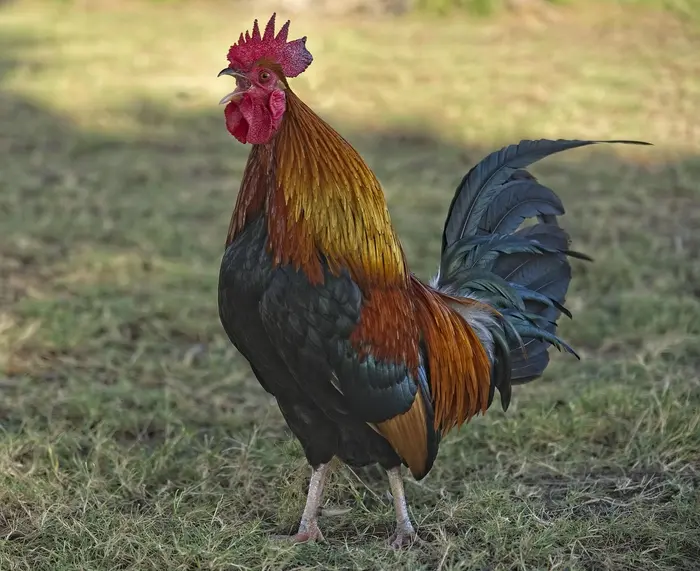
Earlier, we mentioned how adding a rooster can increase flock security. This is great, especially if you live in rural areas with no nearby neighbors.
In suburban areas, it’s best to skip the rooster. Roosters’ crows are noisy and may happen multiple times a day, even at night.
This can disturb nearby neighbors. If the coop is close to your bedroom, the crowing might affect your rest.
In essence, add roosters only when you need to protect free-range hens.
Choose Quiet Breeds
If you want a calm backyard flock, choose quiet breeds. They’re not silent, although they’re quieter than a lot of other birds. For example, birds like Australorps, Wyandottes, and Orpingtons are such calm chickens.
You might wonder, if they’re quiet, how do they sound around predators?
Well, when they’re startled or sense danger, they make the usual loud sounds. While they are calm, they will still react to danger and communicate when necessary.
Furthermore, they will also make egg songs after laying eggs. Like humans, some may still be talkative.
In essence, they are easier to manage and can keep a quiet environment.
Keep a Consistent Routine
When you make a consistent routine for your chickens, you can keep them calm. Let me explain.
When chickens know when to expect food, they will likely squawk out of hunger. Same as when they know when to leave the coop. Like any creature, they also develop habits.
So, work towards making a predictable routine for your chickens every morning and evening. This will surely reduce the noisy clucking that happens when they’re worried or impatient.
Provide Distractions
Chickens can get bored too, you know. Plus, sometimes they might be stressed or anxious, which can cause them to be noisy. Sometimes, they just need entertainment to keep them busy and forget their stress.
By providing activities like scattered grains or toys to peck on, you can maintain a calm environment. Also, chickens might make noise from the stress of an uncomfortable coop. Therefore, provide more space, tunnels, and shelters for them to move and explore.
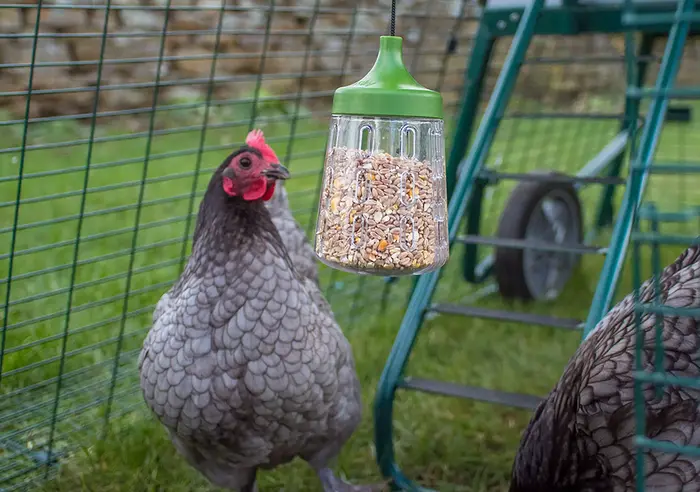
This is the chicken peck toy of Omlet. Peck toys are also available on Amazon.
Frequently Asked Questions
What are chicken clucks?
Chicken clucks are the gentle “buk-buk” sound chickens make when they’re content. When it get’s loud, it could also be the egg song.
How many sounds does a chicken make?
Research showed that chickens make about 30 sounds of which 19 distinct chicken sounds can be identified. These sounds serve different purposes, and the most common sounds were mentioned in this article.
Why do chickens sound like sirens?
This usually happens when there’s a threat nearby. Chickens make fast-paced cackling that increases as the threat gets closer.
Why are my chickens so noisy?
Chickens can be noisy for all sorts of reasons. If it’s not a signal of threat, they’re communicating like social animals. It’s more concerning when they’re silent, but sometimes the noise can also get annoying.
Final Thoughts
Chickens have their own language. The chirp, cluck, and squawk are a means to communicate. Since they can’t talk like us, these sounds help us know what is happening.
Identifying these sounds didn’t only reveal when to act but also the flock’s lifestyle. How amazing of the rooster to be a gentleman to the hens. Another amazing lifestyle is how the hens join together to celebrate the laying hen. Who knows, you could realize more interesting things when you study your chickens.
Furthermore, chickens are going to make a lot of noise because it’s their nature. So when that rooster crows at 3 AM, don’t stress the meaning. The meaning is clear: “NOISE.” If you’re like me and want chicken sounds out of your head, you’ll need to calm the flock down. Hopefully, we’ve clucked out some effective tips here. With good care, you will have a calm chicken sound.

